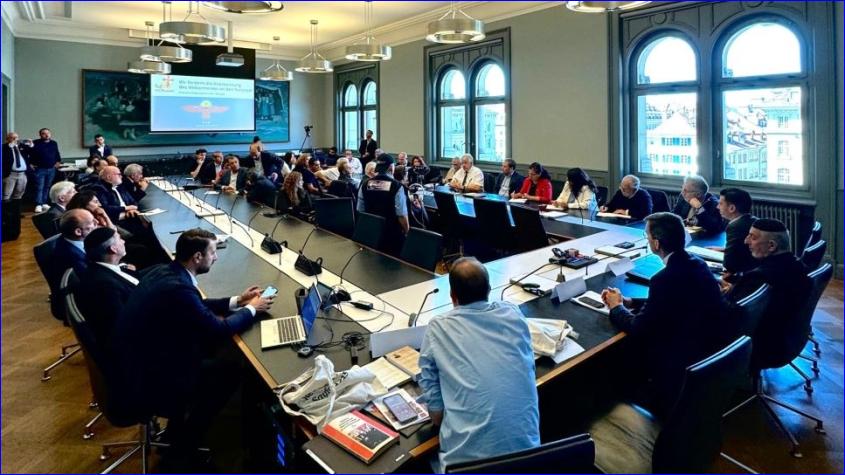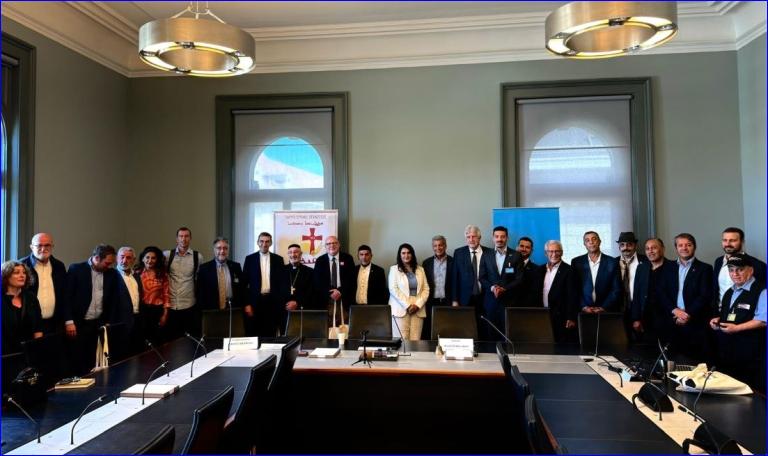


Related: The Assyrian Genocide
The conference gathered members of parliament, Church representatives, diaspora organizations, human rights defenders, as well as Syriac (Aramean--Assyrian--Chaldean) parties and institutions.
European Syriac Union Co-Chair Manuela Demir emphasized the importance of holding such a timely conference since Syriacs and Christians today face violent attacks and inequality in the Middle East.
"It is of great importance to have gathered here today in the Swiss Parliament, Bern, at this Sayfo Genocide Conference organized by our European Syriac Union, in the presence of representatives of the peoples who underwent the Sayfo and of Swiss parliamentarians," she stated. "This conference is an important milestone for genocide recognition by the Swiss government. We hope and expect that the parliamentarians present will raise the issue of recognition of the Sayfo Genocide within the relevant bodies of government."
In his address, Swiss Federal MP in the National Council ("Nationalrat") Cédric Wermuth (Social Democratic Party of Switzerland) stressed that while history may not repeat itself in the same way, it often reappears in similar patterns where vulnerable groups suffer the most during conflicts between great powers. He underlined that recognizing genocide is not only a duty to history but also a safeguard for the rights of people today.
Dr. Toros Korkmaz, who holds a PhD from Zürich University (The Armenians in Turkey's Public Life (1975-2017) Case Study: Hrant Dink and Agos) opened the keynote speech by stating that the Syriac (Aramean--Assyrian--Chaldean), Armenian, and Greek peoples of Anatolia and Beth Nahrin (Mesopotamia) endured oppression, massacres, and forced displacement under Ottoman rule. Following the establishment of the Turkish Republic in 1923, these groups were branded as "traitors" collaborating with imperial powers -- narratives that, he emphasized, distort historical reality.
Korkmaz, of Armenian descent, explained that these peoples were systematically targeted and that their cultural heritage faced erasure. He described exclusionary and discriminatory policies imposed first by the Ottoman state and later by the Turkish Republic, including forced name and religion changes -- the Turkish surname Korkmaz being a direct example of this. He noted that for centuries, non-Muslim subjects were treated as "Dhimmi," second-class citizens, permitted to practice their faith but burdened with heavy "protection" taxes, barred from owning arms, and excluded from government service.
"We, as descendants of those peoples, grew up without forgetting the tragedy our ancestors endured," Korkmaz said. "Their economic, cultural, and social rights were stripped away, their churches, schools, and heritage were destroyed. Even today, the Syriac people in particular faces challenges in language rights, property, and cultural recognition."

He concluded by calling on Turkey to take historical responsibility for the Sayfo Genocide.
When asked about prospects for recognition, Lukas Reimann, MP for the Swiss People's Party (Sweizerische Volkspartei), stated that while there is currently "no final or concrete step," efforts continue.:
"I think this conference is necessary and important so that Parliament can draw attention to the terrible crimes committed during the Sayfo Genocide of 1915. With an event like this, we are raising awareness of this. Our aim is for Switzerland to recognize the genocide."
Fellow parliamentarian Sibel Arslan (Green Party) conveyed a message of support for Christian minorities who continue to face many difficulties in the region and that it is important to draw attention to this. She stressed the importance of cooperation between the Syriacs (Arameans--Assyrians--Chaldeans), Armenians, and Greeks in this regard. Her message to the Swiss Government was one of more decisive action, noting that "recognition cannot come from one side alone and requires stronger commitment from Switzerland's major political parties."
Tamer Çilingir, representing the Greeks and author of a book on the Pontus Greek Genocide, reminded the audience that the Pontus region was a cultural and intellectual hub for Greeks for more than 3,000 years. In the early 20th century, the region experienced a flourishing comparable to the European Renaissance. Yet between 1914 and 1923, Pontic Greeks fell victim to genocide through systematic mass killings and deportations. He called on the Swiss Parliament to acknowledge this history and help advance justice.
Speaking on behalf of the European Syriac Union, Lucas Sagur reiterated that Syriac (Aramean--Assyrian--Chaldean) people in Anatolia and Beth Nahrin (Mesopotamia) endured genocide, and recognition is not merely a historical obligation but a present-day human rights necessity. He stressed that Turkey must be part of this initiative.
The floor then went to Syriac Orthodox Chorepiscopus Father Karim Asmar, who opened his remarks with the Syriac greeting "Shlomo, brikh tahro" (Peace, good day). He clarified that his participation was not to reopen wounds but to highlight a dark chapter in history that demands recognition. Sayfo, meaning "the sword," he explained, is remembered not out of bitterness but out of a desire for justice, dignity, and love for those who were killed. They must never be forgotten with the passing of time, he said. They are martyrs, cut down by those who abused power.
Father Karim Asmar reminded the gathering that the Syriac (Aramean--Assyrian--Chaldean) forebears chose death over forced conversion, leaving later generations the responsibility of preserving their legacy and ensuring such injustice is never repeated. "The many names -- Syriac, Assyrian, Chaldean, Aramean -- refer to one people with a shared language, faith, land, and history," he stressed.
Drawing on both historical evidence and personal stories, he argued that the Sayfo clearly qualifies as genocide under international law. Switzerland, he urged, should take the lead in this recognition:
"We must learn from past suffering, protect human rights, and stand with justice. The Sayfo is not just history -- it is a right that must be acknowledged. Switzerland is uniquely placed to shoulder this moral duty."
The conference is expected to release a closing declaration in the coming days, outlining how Switzerland can take steps toward recognizing the Sayfo and other genocides.

or register to post a comment.